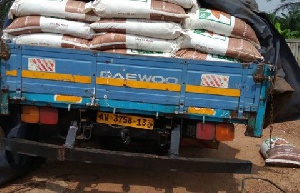 Subsidised fertilizers in Ghana the lowest in the sub region
Subsidised fertilizers in Ghana the lowest in the sub region
Dr Nurah Gyiele, Minister of State responsible for Food and Agriculture, has appealed to communities along the nation’s borders to form volunteer committees to monitor and help check smuggling activities.
He said government’s subsidised fertilizer policy is to help reduce the burden on farmers and help them expand farm acreages with improved crop yields.
Dr Gyiele said some are, however, abusing the policy by smuggling the subsidized commodities to the detriment of the small scale farmers.
He said currently the subsidised fertilizers cost GHC 57.50 a bag and it is considered the lowest price in the entire sub region hence the need for all to guard against the smuggling of the commodity to neighbouring countries.
Dr Gyiele said this during a meeting with District Directors and Agricultural Extension Officers at the Ministry of Food and Agriculture in Wa.
He said government’s policies and investment in agriculture would be wasteful and meaningless if stringent measures are not introduced at the regional and district levels to curb smuggling of farm inputs.
Dr Gyiele was in the Upper West Region to have first-hand information about the progress of work on the “Planting for Food and Jobs” programme and the distribution patterns of government’s subsidised fertilizers.
He was also there to find out about the emergence of the fall army worm in the region and efforts being made to control the worm which has destroyed about 100 acres of sorghum at Busa in the Wa Municipality.
Dr Gyiele said government’s programmes on agriculture favoured the northern farmers where arable land abound and urged agricultural extension officers to make more effort to register the many small scale farmers in the region.
He said the “Planting for Food and Jobs” programme is expected to register 130,000 farmers this year and out of the figure, the Northern Region has registered 14,302 farmers, Upper West Region recorded 17,063 farmers while the Upper East Region has registered 23, 000 farmers.
Dr Gyiele also called on the media to help in the sensitisation efforts to ensure that more farmers are registered on the programme.
“Agriculture has no colour, we want to solve the food insecurity in Ghana and put sufficient food on the table of Ghanaians. This, however, depends on the agricultural extension officers to ensure that farm inputs and machinery provided got to the right farmers and at the appropriate time”, he said.
On the issue of missing fertilizers in Upper West Region, Dr Gyiele said it was not possible for fertilizers to get missing because any fertilizers which has not been delivered to officials of the Food and Agriculture for distribution to farmers, such fertilizers still remained the company’s property and not that of government.
Mr Seth Osei Akoto, Director of Crop Services, who was in the region with Dr Gyiele, said government had procured sufficient chemicals to fight the fall army worm and efforts are being made in this regard.
He announced rice, sorghum, soyabeans and maize seeds as well as pepper, tomato and onion seeds have arrived in the region under the “Planting for Food and Jobs programme”.